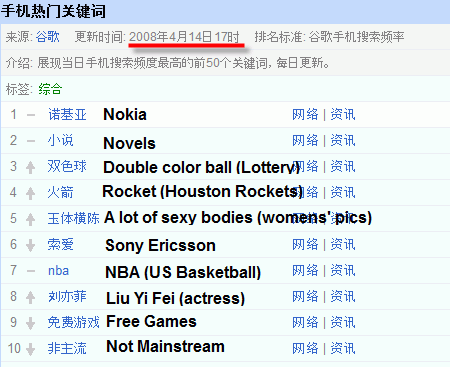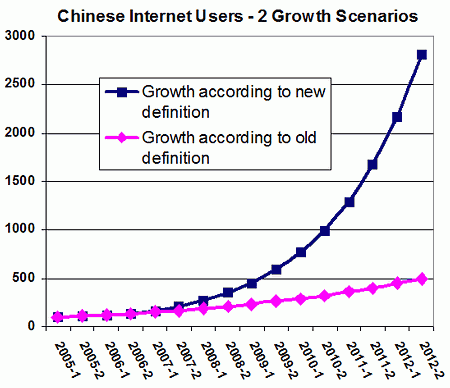China has now more internet users than the US. That was one of the items that made its way into almost all news media in the middle of March. Linking China and the internet makes a newsworthy item these days. More about that later on. First look at what Google has changed about their interface, some mobile search statistics, the new Baidu Instant Messenger and Facebook is coming to the Chinese mainland.
Google.cn has a new user interface
The Korean version of Google was the first, sometime ago already, that was pimped with new buttons under the search box. Now Google.cn has followed (Google Japan also has a new look but slightly different then the Chinese version) and shows animated shortcuts to video search, images, news, maps, blog search, Rebang and the directory page Daohang.
Two of these features need a further introduction.

On Rebang (hot list) you can find metrics about the most popular keywords, including hot keywords for specific categories like real estate, entertainment and more.
Daohang is a directory with popular websites. Baidu has their own version and owns also the very popular hao123. It was previously rumored that Google owns directory site 265.com but that was denied. Google does, so much is clear, provide the search functionality for 265.com.
Localizing the Google.cn page and creating direct access to properties like Daohang is intended to better play into the Chinese users preferences.
Mobile search Stats
There were at the end of February 2008 more than 565 million mobile phone users according to a statement from the industry and information ministry. I don’t know the number of users that have access to the internet with their phone but it’s an educated guess that that number is increasing rapidly. From the search point of view it is interesting to know what people are searching for on their mobile.

Google.cn offers on the aforementioned Rebang statistics about the 50 most frequently searched keywords as well as the top 50 mobile image searches. The statistics are daily updated and the searches are for games, celebrities (including basketball players) and not surprisingly mobile phone related stuff.
Baidu Hi Messenger
The search engine Baidu has started its public test with a select group of users for the Baidu Hi Messenger, a new addition to the Baidu tree.
The current market leader by afar is Tencent’s QQ Messenger. In their 2007 fourth quarter and Annual Results they say they have now more than 300 million active users. I don’t challenge the fact that they’re the market leader but I have to add here that the number of 300 million active users sounds slightly overestimated as there aren’t that many internet users yet in China. From what I hear is that many users have more then one account
Number 2 is MSN Messenger which has, according to Analysys Intl., more than 19 million users. MSN messenger is said to be more popular in the working environment. Other players in the IM market are Sina UC (4.1%), Fetion (China mobile) (3.7%) and Aliwangwang (Alibaba) (3.1%).
The first impressions of bloggers and beta testers Tangos and Mobinode are for the most positive and considering Baidu’s domination in the Chinese internet market I wouldn’t be surprised if Baidu Hi will start challenging QQ and MSN at some point in the future.
Baidu announced that some 1 million users have already tested the new IM, the big question here is how many will still be active after 6 months as CWR puts it.
The downside of yet another IM tool that is based on a proprietary protocol is, that it’s a hassle to deal with so many different chat applications that don’t interact. Given that Chinese users are pretty apt at online multitasking that might probably be more my problem though.
To learn more about the IM market in China and QQ in particular I can recommend reading this report.
Facebook coming to China
Facebook has started hiring staff for its China branch according to Inway. Added to this, Facebook users in China have received messages on their main pages asking them to help them out with translating the site into Chinese. The big question, as with so many foreign internet companies trying to get a foothold in China, is whether Facebook will succeed.
Jeremy Goldkorn from Danwei, shares his opinion in the Timesonline:
I don’t think they’ll fare well – there’s not a single foreign internet company that has managed to dominate its sector,” and adds “It’s also a cultural thing,” Mr Goldkorn said. “Facebook is based on people using their real names and being honest, whereas the Chinese like the ability to be anonymous. E-mail addresses will rarely include a person’s name, and on bulletin boards a lot of the posts are anonymous, so I’m not sure the Facebook model will work.
In addition to this there’s also the issue of censorship. Will the content, the groups and the discussions be monitored by Facebook themselves or will they wait till the censor kicks in. In other words, how localized will the Chinese version be.
Among the local competition that Facebook will face are QQ, Xiaonei and zhanzuo
China user Statistics Bait
As I mentioned in the introduction I was impressed by the China bait of a research company in Beijing. They released a press release telling the world that China has overtaken the US in the number of Internet Users and it’s an example of very smart pr.
What they did was opening their excel sheet and calculate the growth percentage between the last 2 reports, being 29%. This results in an expected 272 million users by July 2007. The last official report by the CNNIC said there were 210 million users. The difference is 62 million in 6 months. A monthly growth of 10.37 Million.
Outcome, mid March there were more than 220 million internet users in China and as the US had 216 million users at the end of 2007 according to Nielsen, this made that, following these calculations, China now has the most internet users in the world.
The news was picked up by all the mainstream media and I’m sure it raised their profile.
I have previously written about the fact that the CNNIC changed their definition of what constitutes a Chinese internet user. Previously it were “Chinese citizens aged 6 and above who averagely use the Internet at least one hour per week”., but since the report from June 2007 (2007 – 1 in the chart) it’s someone who has used the internet in the past half year.
This of course has influenced the total numbers of internet users. As a small excel exercise I have made a chart comparing the previously (before the new definition was used) half year on half year growth percentages and the current growth percentages.

Taking the old growth scenario, China will overtake the US sometime in 2009. Taking the new scenario the conclusion here is that China will have more internet users in 2011 than inhabitants. Wouldn’t that make for a nice headline?
It’s not scientific at all of course as there will come a moment the growth will slow down and there’s no doubt there are a lot of users in China but it’s something to keep in mind if you make a prognosis.
Some more tidbits
Baidu voice search launched again
Sogou Clicks to call
Firefox starts campaign to seize market share.
Everything you always wanted to know about penetrating the Chinese firewall.
Alimama, Alibaba’s online ad exchange, challenges Baidu and Google by cutting its fees.
That’s it for now from Shanghai, China





